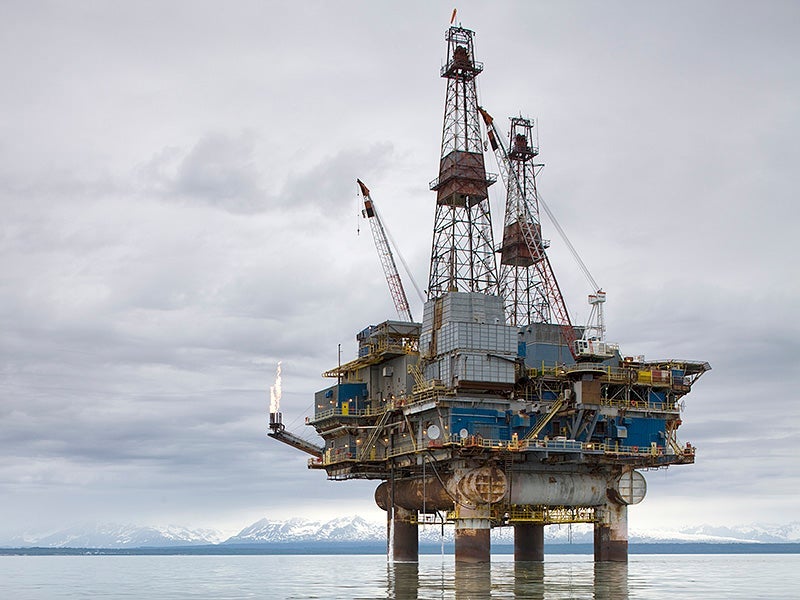A Rare Whale Is Safe From Oil and Gas Drilling — for Now
A judge overturned the Biden administration’s reckless lease sale in Cook Inlet, citing threats to the rare beluga whale.

This page was published a year ago. Find the latest on Earthjustice’s work.
Endangered beluga whales and sea otters in Alaska just got a reprieve from fossil fuel development that could have further imperiled them.
A federal judge suspended an offshore lease in Cook Inlet, finding that the federal government broke the law when it auctioned off critical marine mammal habitat for oil and gas drilling. On behalf of local environmental groups, Earthjustice had challenged the lease sale in court.
The judge faulted the government for failing to consider the lease sale’s cumulative impacts on beluga whales. Because the whales depend on echolocation to navigate, blaring noise from oil and gas vessels threatens their ability to survive, which the government did not account for. The ruling requires the Department of Interior to conduct a new analysis and puts the current lease on hold while the process is underway.
The ruling is not just a boon for endangered species, but a victory for Alaska communities that make a living from fishing, tourism, and other activities in Cook Inlet. It’s also a win in the fight against a climate crisis driven by fossil fuel extraction. Here are five reasons this lease sale was a terrible idea:
Beluga Whales
Cook Inlet’s belugas are genetically unique from other beluga whales, making them essential to the Cook Inlet ecosystem. They are also culturally and economically significant to the region and its people. The endangered belugas are suffering the consequences of Cook Inlet’s active oil and gas infrastructure in its state-owned waters. One study shows that carcinogenic compounds found in the water from oil and gas production in Cook Inlet are likely tied to gastrointestinal cancer in the area’s beluga whales. Today, just over 300 Cook Inlet belugas remain.
Oil and gas leasing would further assault Cook Inlet’s belugas with seismic blasting, contaminated water, shipping traffic, heavy construction, and the risk of catastrophic oil spills.
Oil Spills
The government’s own environmental analysis predicted a 1 in 5 chance of a large oil spill occurring from a Cook Inlet lease — yet egregiously downplayed those impacts. Even small spills will travel through the water column and pollute connected waterways.
The oil and gas industry has repeatedly failed to prevent or contain disastrous oil spills on Alaska’s coast. The infamous Exxon Valdez oil spill in 1989 poisoned Alaska’s beaches and wildlife, and significantly harmed Alaska’s Indigenous communities. In the words of Chief John Kvasnikoff of Nanwalek, Alaska, “We could not collect our foods; we were suddenly poor in ways we’d never known.”
Even more worrying, the buyer for the Cook Inlet lease sale, Hilcorp, has a track record of repeated oil spills and safety violations — including in Cook Inlet itself.
Climate Crisis
Alaska is the fastest-warming state in the country according to the most recent National Climate Assessment. The last thing Alaskans need is more carbon-emitting infrastructure.
As the North Pacific Ocean heats up and Arctic sea ice retreats, marine animals are migrating farther north in search of food and cooler waters. This affects myriad aspects of life in Alaska and has dramatically changed the region’s ecosystem.
The Biden administration has made lowering U.S. carbon emissions a national priority. Selling new oil and gas leases in one of the world’s most climate-sensitive regions goes directly against our national security and the administration’s climate goals.
Alaska Fisheries
Alaska’s world-renowned fisheries produce more fish than all other U.S. states combined.
The Cook Inlet watershed is one of the most productive in the state: It supports five species of wild Pacific salmon, herring, scallops, halibut, and other bottom fish. Additionally, many of Alaska’s Indigenous communities have relied on subsistence fishing for millennia.
Yet climate impacts are disrupting Alaska’s marine life: In 2020, a heat wave killed off much of Cook Inlet’s Pacific cod population, leading local fishery managers to close Cook Inlet’s federal cod fishery for the first time. Increasing oil drilling in Alaska will only have deadly consequences for its essential marine ecosystems.
Tourism
Southcentral Alaska, where Cook Inlet is located, has a vital and sustainable tourism industry. Bordering the north of Cook Inlet are Lake Clark and Katmai National Parks, areas famous for bear viewing — which brings in $34 million annually. The government’s analysis acknowledged that these parks would be at high risk of an oil spill from the Cook Inlet lease sale, but, again, stopped short of analyzing the impacts this would cause.
Originally published on December 22, 2022. This blog was updated to reflect Earthjustice's legal victory.
Opened in 1978, our Alaska regional office works to safeguard public lands, waters, and wildlife from destructive oil and gas drilling, mining, and logging, and to protect the region's marine and coastal ecosystems.